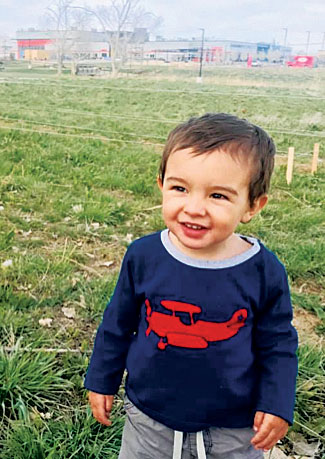
VEC is starting construction of its Village Farms at Stanley. Pedro Romero, age 1½, stands before stakes marking where VEC is building garden boxes to promote community as well as food and job security. Photo courtesy of VEC.
How Nonprofits are Adapting
Typically run on tight budgets with minimal staff, local nonprofits can often be more nimble than other entities, refining or pivoting programming to quickly adapt to changes. To understand how the pandemic and the stay-at-home orders are impacting those serving some of our most vulnerable neighbors, Front Porch spoke with representatives from SafeHouse Denver, which serves survivors of domestic violence, and Village Exchange Center, which serves immigrants and refugees in the Aurora neighborhood adjacent to Stapleton.
SafeHouse Denver
Abby Hansen, Director of Counseling and Advocacy Services at SafeHouse Denver says her team “is seeing a significant dip in our calls to the crisis line.” For a second, this feels like something to celebrate. But the second passes and Hansen shares a chilling insight from her 15 years in the field: “It makes me think that those survivors that are in immediate crisis can’t access our services because the abusers are home, their kids are home.”
Hansen anticipates “a dramatic spike in our crisis line calls” and referrals once the stay-at-home orders end. For now, she says: “Survivors do what they always do. They survive. Women especially are very savvy about reading their perpetrator and about finding extremely creative ways to change their environment to appease perpetrators and keep the peace while they need to.”
Founded in 1977, SafeHouse Denver operates three facilities to serve those fleeing intimate partner violence. DPD data matches Hansen’s anecdotal information, with District 5 reporting an 8.3% drop in domestic violence incidents, part of an overall decline in crime, which is down 21.5% over the previous 28-day period.
SafeHouse continues to staff its hotline and residential facilities, though it is presently unable to accept new residents because it has to ensure adequate space should any current residents need to be isolated. Advocates have increased reliance on phone counseling to serve clients, and they continue to accept referrals. Hansen says the cases they are seeing now, however, tend to be more complex, with multiple challenges facing survivors. The shortage of housing options remains one of the biggest obstacles for survivors in Denver. Once someone decides to leave a violent partner, they cannot wait months or years to move to safety.
Hansen, a licensed clinical social worker who resides in Park Hill, appreciates the community’s expressions of support for healthcare workers. She asks that people remember that “Domestic violence advocates are also first responders,” and worries about her staff, who now work in isolation while also absorbing a lot of trauma.
Village Exchange Center (VEC)
“We were always serving the homeless, near-homeless, refugees, immigrants,” says Stapleton resident Amanda Blaurock, co-founder and Executive Director of Village Exchange Center. VEC opened its doors on Havana St. in 2017, in a building it shares with like-minded partner organizations. VEC serves a predominantly immigrant and refugee population and celebrates diversity while building bridges across ethnic and faith communities.
Though it offers a host of programs, it is the food pantry that has grown exponentially in the past month. Whereas they used to serve 225 individuals twice a week, VEC now provides food, diapers, and toilet paper to 1,400 individuals weekly. To scale operations to meet this need, VEC added food delivery and volunteers. Faith leaders and others from more than 10 organizations are also picking up and distributing food bags directly to their communities.
VEC further innovated by employing the Routific app to coordinate logistics and communications across staff, volunteers, and clients. Soon VEC will be able to help with some healthcare needs for the uninsured: “We are partnered with the Dawn Clinic…to get prescriptions, Tylenol, and oxygen concentrators to people who are COVID-19 positive,” says Blaurock. VEC is also partnering with organizations to support the Undocumented Workers Fund, which is providing assistance to undocumented hospitality workers.
Through a gift from Stanley Marketplace, VEC is launching a new program, The Village Farms, to further its commitment to self-sufficiency, job security, and food security. Stanley partner Jonathan Alpert confirmed that Stanley is giving VEC a 20-year lease to grow produce and have a commercial space that will one day include a tea house, in partnership with Denver Botanical Gardens. “Imagine a beautiful indoor and outdoor tea house that’s also an apothecary, where our community members make different teas and herbal remedies from their countries,” says Blaurock.
“We want to plant culturally appropriate food and distribute food to our community either free or at a reduced price…additionally we have restaurants at Stanley Marketplace that would purchase our food as farm to table,” says Blaurock. Though vertical gardens and hydroponic farming are part of the plan for The Village Farms at Stanley, the pandemic has shifted the immediate focus to building sixteen 50-foot farm boxes this spring. VEC offers naming rights for individual garden boxes to recognize donors who contribute $7,000 toward one box’s construction.
SafeHouse Denver and Village Exchange Center welcome donations to support their efforts. To learn more: SafeHouse: https://safehouse-denver.org or call 303-318-9989 for the 24-hour crisis line. VEC: https://villageexchangecenter.org or call 720-668-9968.



0 Comments